QuestionHi there,
I have a bearded Dragon who is about 8 months old. He lives in a viv of 90 by 45. He has lots of clibing logs. We use tiling instead of sand. For uv we use Repti Glo 10 compact lights and Repti Glo 2.0 full spectrum compact light. (this was reccommended to us at the pet shop). We use Sun Glo basking lamp and a glow reflector. His te,peratures (hot side) are between 39 and 43 degrees C, and (cool side) between 25 and 29 degrees C. He is fed crickets twice a day, no bigger than the space between his eyes. I give him about 8 in the morning (9.00am) and about 8 in evening (5pm). He can always eat more, but I was advised not to give him more. He is fed spring greens, green beans and watercress daily, and occasionally has a rasberry, blue berry, peice of watermellon, wax morm (only as a treat) No more treats than once a week. On a friday we just give him greens, our vet reccommended he have a 'no cricket day'. 3 times a week, he has a calcium suplement dusted over crickets (nutrobal) and a vitamin supplement 3 times a week (calci dust, by VetArk) The days are alternated (one day calci, next day nurtobal)
Last week, he had a fit. I had him out and he made a strange noise, as if he was trying to be sick, then he started thrashing about, with his syliva flicking about. He went to the toilet straight after this, then went very black, still and looked sleepy. I took him to the vets within 20 minutes of this happenning, and they kept him in. During this time they did a blood test, an x ray, and tested his poo. They found nothing from the blood test or x ray. However he had millions of parasties living inside him. The parasite found, the vet said was always found in lizards, but only a small amount. The vet told me there was some controversy about some people saying this parasite is needed in small amounts to aid digestion, where as some say it should be got rid of. The vet said he was amazed by how many there were in him. He said they were probably picked up from the breeder when we first got him. He was given meds for this.
We picked him up the next day, and he seemed fine. This week he has been eating fine, active, his usual self.
However on Friday he had another fit. It was no where near as severe, just small, but again, he went to the toilet, and became lethargic. Today, he has had another fit. He became very sleepy, and his breating was heavy. And you could hear the sylva in his mouth sort of being blowed out (like a runny nose) The vets is closed and I will be taking him first thing in the morning. I'm very concerned though, as they have already done a blood test and there was apparently no problem. Is there any test I can ask for that they may not have done? Could this be the parasites, maybe they have not all gone?
He was fine prior to the fit, he had been really active and gobbled up his dinner (he loves both crickets and veg and always eats really quickly)
I hope this is enough information for you to advise me,
Thank you, Catherine
AnswerHi Catherine,
I almost have to assume that the vet ran a blood calcium level, that would be pretty standard. Did he mention that at all or if the result may have been slightly low or borderline normal? Blood calcium levels can fluctuate and low blood calcium levels can cause seizures. These seizures are often triggered by (but not caused by) handling. The condition is called tetany and is discussed a bit more here:
http://www.veterinarypartner.com/Content.plx?P=A&A=1603&S=4&SourceID=56
In mild cases you may only notice slight twitching of the toes but in acute situations full muscular contractions can occur. These symptoms can come and go as the blood calcium levels fluctuate.
Calcium is not absorbed well without the presence of animal based vitamin D3 (or cholecalciferol) in addition. Plant based vitamin D2 does not seem to be well utilized by reptiles. It must be Vitamin D3 in your supplement in order for your dragon to be effectively absorbing the calcium that you are adding to his diet. I am not familiar with the U.K supplements you are using so you will need to check the label.
It is recommended that beardeds be both supplemented with dietary D3 and allowed to synthesize their own through exposure to UVB rays. The brand of bulb that the store recommended has not been the best of performers when it comes to providing UVB ( determined through independent testing). Beardeds can be raised on supplemented vitamin D3 alone without the bulb but it is not recommended and if your dietary D3 is insufficient (or actually D2) then you can still have calcium deficiency issues despite your regular dusting.
On to the parasite part of the question. I am not aware of parasites directly causing the fits you describe but they certain can cause malabsorption of nutrients such as calcium. Coccidia and pinworms are both extremely common in bearded dragons. Beardeds almost always have some in small amounts and they are treated when the parasite load becomes high. Coccidia can actually be transferred through the egg from the mother to baby beardeds.
From you vet's comments it sounds like he found pinworms which are thought to aid in the digestion of plant material in herbivorous and omnivorous reptiles. There is evidence to support this but the potential for pinworms to become a super-infection due to their direct life cycle prompts many vets to treat them regardless of number. I am not aware of coccidia contributing anything but trouble but again, small amounts are fairly common and usually without symptoms.
I'm not a vet and try not to play one on the internet! I also don't want to be second-guessing yours but the fluctuating symptoms and seisures with intermittent return to normal behaviour would prompt me to ask my vet about bouncing blood calcium levels if I were in your situation.
Your general husbandry, set-up and diet sound great and you have obviously done your research on the care of your bearded. I hope you can get to the bottom of this problem.

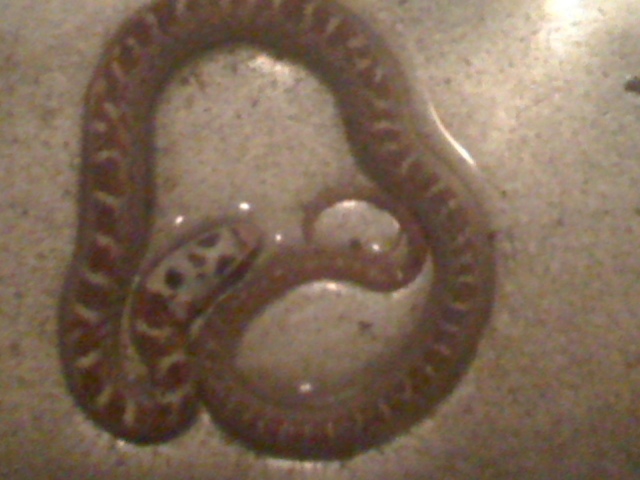 Snake ID?
Question
snake
This snake was found in my backyard. I h
Snake ID?
Question
snake
This snake was found in my backyard. I h
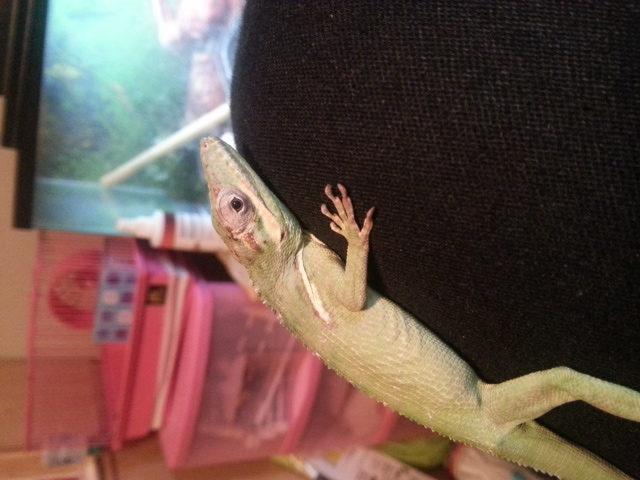 Cuban Knight Anole
Question
Grimm
Hello! I have a four month old Kn
Cuban Knight Anole
Question
Grimm
Hello! I have a four month old Kn
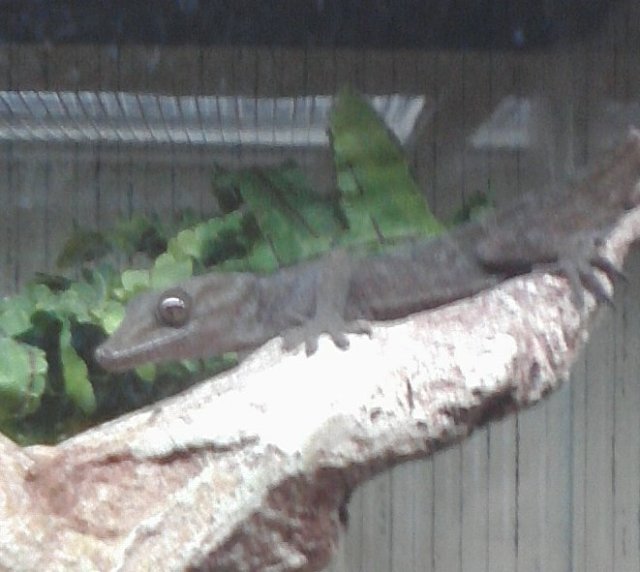 frank
Questiongidget
QUESTION: Well, Ive been research
frank
Questiongidget
QUESTION: Well, Ive been research
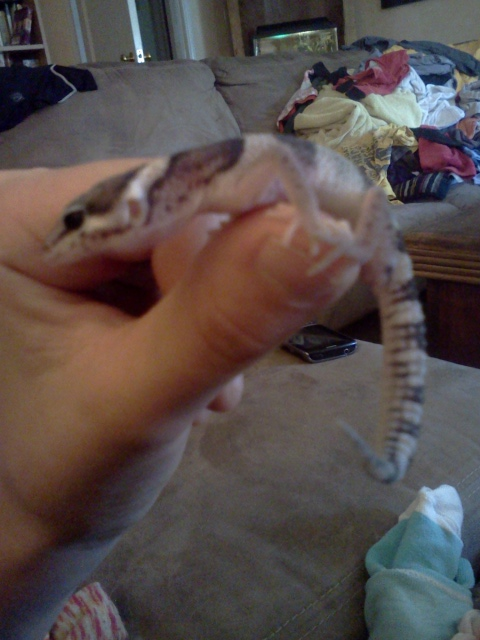 baby leopard gecko morph
Question
Rocky
I just got a super cute baby geck
baby leopard gecko morph
Question
Rocky
I just got a super cute baby geck
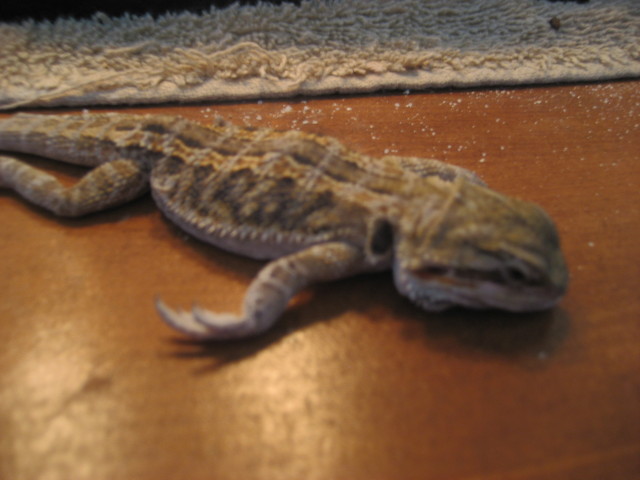 stomach blockage?
QuestionQUESTION: I got my first bearded dragon last ch
stomach blockage?
QuestionQUESTION: I got my first bearded dragon last ch